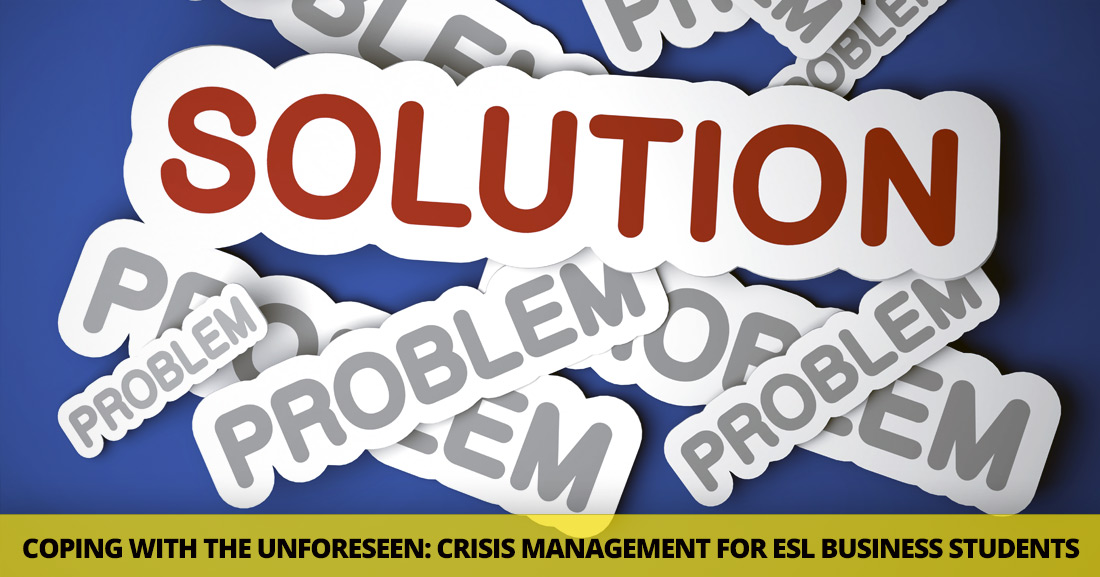Game On: How to Design Realistic ESL Business Scenarios


My school was struggling to hire ESL Business teachers, so I volunteered. I’m not trained in business or economics, but I found that a few hours’ research equipped me sufficiently to guide ESL students through the most important topics. Ultimately, it’s just another subject area, like the weather, or sports, or family life, and if you’re looking for a fresh challenge, I encourage you to give it a try.
I’ve noticed a trend in the business press, and I knew it would make a good module for my ESL Business students. A portion of each day’s business and finance news seemed to focus on what was going wrong; businesses were going bankrupt or suffering from the aftermath of a scandal, or their share prices were plummeting following poor quarterly results. Our students will almost certainly encounter the unforeseen in their professional lives, and our two-day unit on crisis management has proved useful and popular.
We don’t have to look far to find examples of businesses in crisis. I found it useful to assign a short research task, after which small groups of my students reported on their topic to the class. A good range of past examples would include:
A quick analysis revealed the causes of the problem, the action taken by the company (which, we often found, was too little and too late), and the public reaction to the events. By briefly analyzing these crises, my students were already seeing some of the major crisis management methods in action.
We moved straight onto brainstorming the methods a company might use to predict, deal with, and learn from crises. My more experienced classes were very familiar with these processes, while the younger students needed help to think them through:
Before the Crisis:
During the Crisis:
After the Crisis:
Before delving into detailed scenarios, give your students a few moments to consider the crisis response of an oil company, a tech giant, and perhaps a national government’s Foreign Affairs department. What plans would they put in place in advance of a crisis? What kind of role-plays would be useful preparation?
Then, throw them a crisis and see how they deal with it. An oil spill, a huge information leak or technical failure, or a sudden flare-up of tension overseas all serve as good initial examples. What additional advice would they need? What information would they release, and when, and how?
Then, have them continue to the post-crisis phase. What might the financial costs be, both in the short- and long-term? What might their organization be able to learn from such a crisis, and how might they prepare for another similar issue in the future?
This is where you have the chance to bring in some creativity. It’s easier than you might think to design a three-stage crisis management exercise which is built like this:
A movie or video game release prompts a furious response from the media, churches, and/or the public. Do you agree to tone down the content, or rail against such enforced self-censorship?
An adventure vacation company suffers the tragic loss of two of its customers on Mt. Everest. Do you succumb to public pressure and cancel future expeditions, or maintain that your clients suffered from bad luck, and resolve to continue providing such high-risk services?
One of your tankers runs aground and the local coastline is inundated by poisonous oil. This isn’t going to be easy, but how can you reassure your shareholders, handle the public and media, and address the inevitable environmental costs?
Two teenagers are badly injured while riding a newly-opened white-knuckle experience at one of your theme parks. Do you close the ride, or perhaps the whole park? For how long? How could you persuade the public that your rides are safe?
A former employee goes public with allegations of worker mistreatment and poor safety provisions at your company’s factory in Asia. How do you handle the media storm? Do you agree to invest millions in upgrading the factory, or insist that your facilities are safe, according to local codes of practice?
I’m sure you can think of your own – a glance at the business press will provide more examples on which to base scenarios – and I hope you enjoy creating these exercises and then developing them after each class to make them more engaging, controversial, or just plain fun.
By monitoring the exercise carefully, and including the whole class, these can become memorable and enjoyable exercises with a surprisingly real sense of shared purpose.